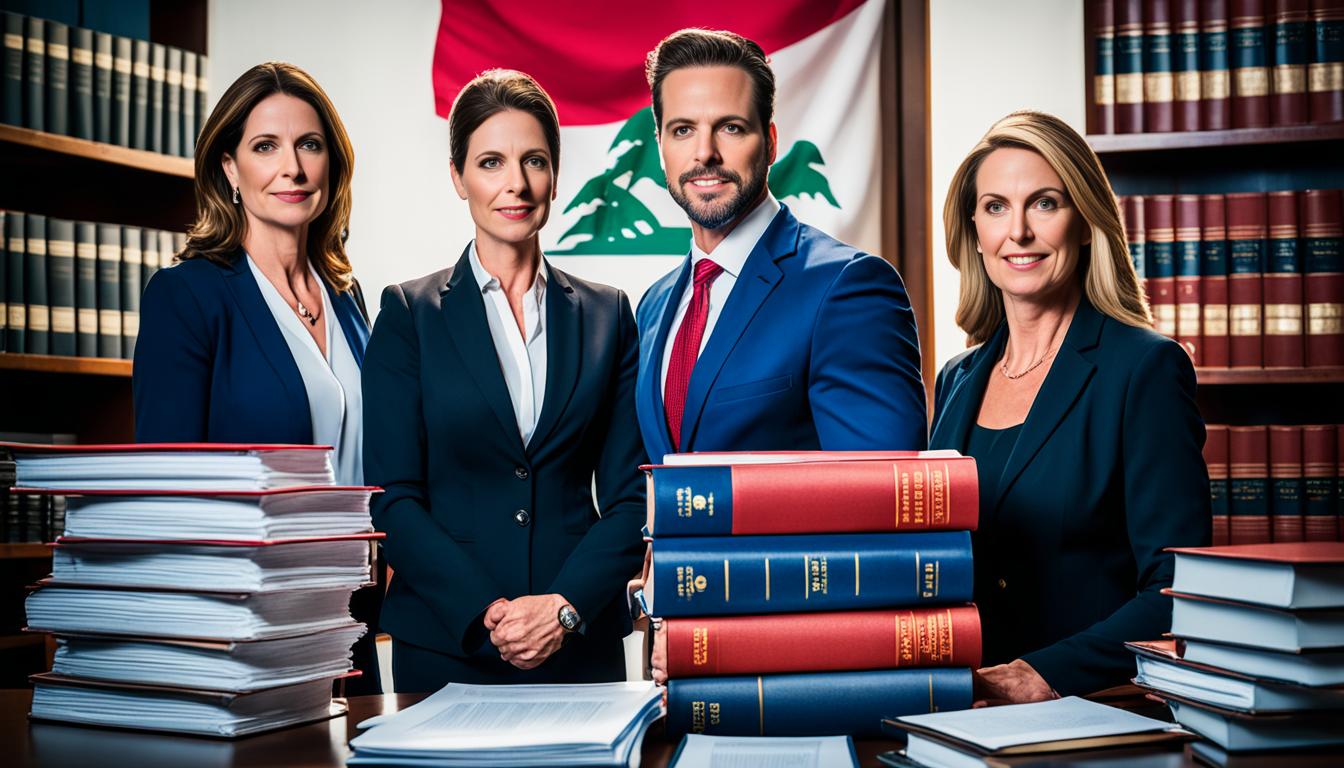All California lawyers must do 25 hours of MCLE every three years. This rule is set by the State Bar of California. If lawyers don’t follow this, they might face fines or other penalties.
It’s important for lawyers to keep up with MCLE rules. This helps them avoid extra fees and stay in good standing with the State Bar.
Overview of California MCLE Requirements
In California, lawyers must keep learning to stay current. They need to get 25 hours of MCLE credits every three years. This includes 12.5 hours of active learning, 4 hours of legal ethics, 2 hours on bias, and 1 hour on competence.
Mandatory MCLE Credits for California Attorneys
California lawyers have to get certain MCLE credits every three years:
- 25 total MCLE credits
- At least 12.5 participatory credit hours
- 4 hours of legal ethics credits
- 2 hours of elimination of bias credits (including 1 hour on implicit bias and bias-reducing strategies)
- 1 hour of competence credits
Three-Year Compliance Periods and Reporting
California lawyers have three-year cycles for MCLE. They must report their MCLE to the State Bar of California by the end of each cycle. The cycle starts based on the initial letter of their last name when they became a lawyer.
Retired lawyers who are still active must follow the MCLE rules. But, lawyers on inactive status don’t have to report or get credits during that time.
MCLE Compliance Fees and Penalties
Attorneys in California must follow the state’s Mandatory Continuing Legal Education (MCLE) rules. They need to complete and report 25 hours of approved courses every three years. Not meeting these rules can lead to big fees and penalties from the State Bar of California.
Now, the fees for not following the rules are higher. You’ll pay a $100 late fee, $100 E-mod fee, and a $300 reinstatement fee. If you don’t meet the MCLE rules on time, you must pay these fees. This is to avoid losing your right to practice law.
- $49 for a 25-Credit California MCLE Bundle A
- 24 courses included in the compliance bundle
- 25 hours of participatory credit needed for California attorneys every three years
- 4 hours of ethics required
- 1 hour for elimination of bias in the legal profession
- 1 hour for competence issues
The california mcle compliance fees can add up fast. It’s crucial for lawyers to keep up with the california mcle requirements. Not doing so can badly hurt a lawyer’s career and reputation.
If you need to ask for MCLE credit or get your license back after being suspended, you’ll face more fees. This shows how important it is to keep up with the state’s MCLE rules.
Breakdown of Required MCLE Credits
As an attorney in California, you must finish 25 hours of MCLE credits every three years. This includes specific hours in different areas. It makes sure attorneys know the latest in law and best practices.
Participatory Credit Hours
You need to get at least 12.5 of the 25 MCLE credits from active learning. This means live sessions like seminars, webinars, or workshops. Here, you get to interact with the material and teachers.
Legal Ethics Credits
California lawyers must also get 4 credits in legal ethics. These focus on the ethics and duties of lawyers. They help lawyers deal with tough ethical issues and keep high standards in their work.
| MCLE Requirement | Credit Hours |
|---|---|
| Total MCLE Credits | 25 |
| Participatory Credits | Minimum 12.5 |
| Legal Ethics Credits | Minimum 4 |
| Competence Credits | Minimum 2 |
| Elimination of Bias Credits | Minimum 2 |
| Technology Credits | Minimum 1 |
| Civility Credits | Minimum 1 |
Meeting these california mcle requirements helps California lawyers. They learn about the latest in legal ethics, competence, and technology. This means they can give their clients the best legal help.
Elimination of Bias in the Legal Profession
California lawyers must take 2 hours of MCLE courses to fight bias. 1 hour of this is about fighting hidden bias and reducing it. This is to make the legal world fairer.
Women make up 45% of lawyers, and minorities 24%. But, only 20% of partners are women, and less than 5% are minorities. This shows we need to work on fairness.
The elimination of bias in law means fighting many kinds of bias. Courses teach how to spot and stop hidden biases. They also help with overcoming age bias and making law more fair for everyone.
By doing these special MCLE courses, lawyers show they care about fairness. As law changes, fighting bias will always be key to being a good lawyer.

“Promoting diversity, equity, and inclusion is not just the right thing to do, but it also strengthens the legal profession by bringing diverse perspectives and experiences to the table.”
The fight against bias is vital for lawyers to grow and act ethically. By following california mcle requirements, lawyers help make law more fair for everyone.
california mcle requirements
As an attorney in California, it’s key to keep up with california mcle requirements. The State Bar of California says all active lawyers must do at least 25 hours of approved continuing legal education (CLE) every three years.
These requirements include certain types of credits. You must get 12.5 credit hours from live events. The rest can be from self-study. Also, you need to follow these rules:
- A minimum of 4 hours of Ethics
- 1 hour of Substance Abuse Prevention
- 2 hours of Elimination of Bias
Starting October 1, 2023, new topics will be added. You’ll need 1 hour on Technology in Law, 1 hour on Civility in Law, and 2 hours on Competence.
You can get all 25 hours you need through the National Academy of Continuing Legal Education. And, you must confirm online on your State Bar Profile that you’ve met the requirements or are exempt.
The rules might seem tough, but they help keep California lawyers sharp and ethical. This benefits the legal field and the clients they help.
Implicit Bias and Bias-Reducing Strategies
California lawyers must learn about implicit bias and how to reduce it. This is part of their training. It helps fight against biases that can hurt trust in the legal system. Studies show that race can affect how people see a lawyer’s work.
A 2014 study showed a memo by an African American lawyer got a lower score than the same memo by a white lawyer. The “Written in Black and White” study also found bias against African Americans in judging writing skills.
To fight these biases, California has made the bias training longer. Now, lawyers must do 2 hours of it. This training helps lawyers be fair and support diversity in law.
“Implicit bias training is crucial for law firms. It helps fight against biases.”
California lawyers learn how to spot and fight biases through this training. This makes the justice system stronger. The course costs between $25 and $65, depending on where you are and if you’re a member.
The effort to tackle implicit bias shows California’s commitment to a fair and open legal field. As California leads, other places might follow. This could change the legal world for the better.

Competence and Attorney Wellness Credits
In California, lawyers must do at least 1 hour of MCLE on competence. This can include learning about stopping and finding substance abuse or mental and physical issues. These issues can make it hard for lawyers to do their job well. They might also do an extra hour on attorney wellness.
This rule helps make sure California lawyers have the skills and health they need. It helps them give top-notch legal help to their clients. By focusing on both skills and health, the MCLE program wants a strong and healthy legal field.
| State | Competence/Wellness Credits | Reporting Period |
|---|---|---|
| California | 1 hour competence, 1 hour wellness | 3 years |
| Alaska | N/A | 1 year |
| Arizona | N/A | 1 year |
| Colorado | N/A | 3 years |
| Florida | N/A | 3 years |
| Iowa | 1 wellness or diversity and inclusion credit | 1 year |
| Illinois | 1 mental health or substance abuse credit | 2 years |
| New Jersey | N/A | 2 years |
| New York | N/A | 2 years |
| North Dakota | N/A | 3 years |
The California MCLE Compliance Bundle 2024 has 25 hours of Accredited CLE. It includes 2 hours on competence issues and 1 hour on attorney wellness. These credits are key for California lawyers to keep growing professionally and support their health.
By focusing on competence and attorney wellness through MCLE, California is leading the way. It makes sure lawyers can serve their clients well and take care of their health.
Technology in the Practice of Law
California lawyers must now take 1 hour of classes on technology in law by January 31, 2025. This rule shows how much law uses technology now. It’s key to know the latest tech for good legal work.
These classes can be about many things, like:
- Cybersecurity and data protection
- E-discovery and tech for managing client files
- Artificial intelligence in law
- Using software and tools to work better
Doing these tech-focused classes helps lawyers get better with technology. This makes them serve clients better in our digital world. The LA Law Library has many technology in law courses for lawyers.
| MCLE Credit Type | Current Requirements (ending January 31, 2024) | New Requirements (ending January 31, 2025) |
|---|---|---|
| Participatory Hours | 12.5 hours | 12.5 hours |
| Legal Ethics | 4 hours | 4 hours |
| Elimination of Bias | 2 hours | 2 hours |
| Implicit Bias/Bias-Reducing Strategies | 1 hour | 1 hour |
| Competence | 1 hour | 2 hours |
| Technology in the Practice of Law | Not required | 1 hour |
| Civility in the Legal Profession | Not required | 1 hour |
Knowing the latest technology in law helps California lawyers. They can work better and help their clients more effectively.
Civility in the Legal Profession
The California State Bar has made a big step to improve civility in law. Starting January 31, 2025, all California lawyers must take a 1-hour course on civility in law. This is part of the california mcle requirements.
Young lawyers, women, lawyers of color, and those from marginalized groups face a lot of uncivil behavior. This can lead to them leaving the profession. It also hurts the legal field’s reputation.
Civility training aims to fix this. It teaches respect, understanding, and ethical behavior. This can stop the bad effects of uncivil actions, like losing cases or not being able to solve disputes.
These civility courses must include written materials. They will cover professional responsibility, how to spot and fight bias, and how to stay well. The goal is to make the legal world a better place for everyone.
| Key Highlights | Details |
|---|---|
| Civility Training Requirement | 1 hour of MCLE education on civility in the legal profession, starting January 31, 2025 |
| Impacted Groups | Young lawyers, women lawyers, lawyers of color, and those from marginalized groups |
| Training Focus | Link between bias and incivility, promoting respect, understanding, and ethical practices |
| Training Format | Written materials, coverage of professional responsibility, bias, and well-being |
By focusing on civility in law through the california mcle requirements, we can make the legal field better for everyone.
Proportional MCLE Requirements
In California, lawyers must complete 25 hours of MCLE every 3 years. But, some can do fewer hours if they’ve been away or were exempt. This rule doesn’t apply to legal ethics and bias training.
Reduced Hours for Inactive or Exempt Attorneys
If lawyers were inactive or exempt, they might do fewer MCLE hours. The number depends on how many full months they were out. Yet, they must still do 4 hours of legal ethics and 2 hours of bias training.
This way, all California lawyers keep up with important legal knowledge. Using resources like Attorney Credits helps lawyers manage their MCLE needs. It’s great for those whose work or life changed during the period.

